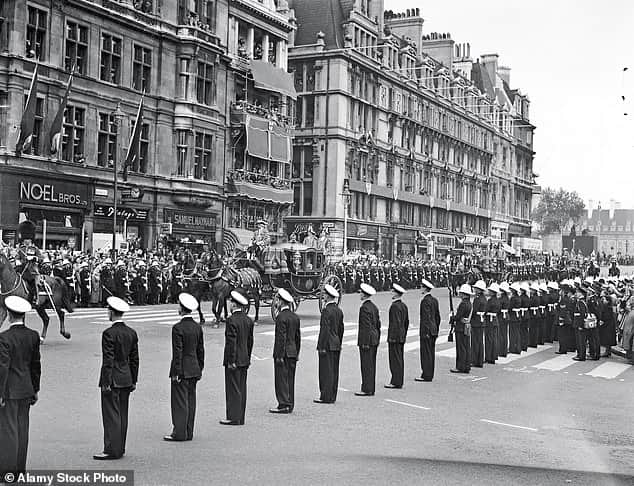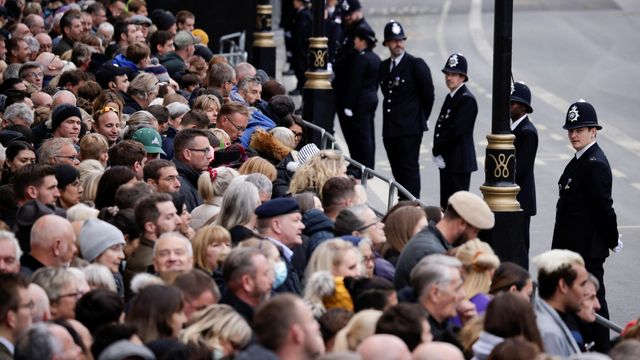Yes a strange group the SPG, a good few being ex forces/ special forces, Most mess games had to be carried out naked…odd bunch of lads, but great lads.
Were you the only one in the family in the police?I had a cousin who always wanted to be one since a child.It’s quite a responsibility,once you’ve got that uniform on,if anything happens you have to take charge and be involved.That’s not for me.
Sounds like our local rugby club.
@Psmith Yes, I had no policing footsteps to follow in, but I never regretted the decision. Lots of the time was mundane stuff, I suppose, but there were a lot of times where it was anything but mundane. It was the sense of the unexpected that I really enjoyed - and the colleagues. I suspect that aspect of policing has never, and probably will never change.
The same breed of men. ![]()
One thing which looked a tad odd yesterday was at the start of the long walk up to Windsor there was an armed police officer obviously on duty and scouring around just in case. This was adjacent to the hearse, which was surtounded by a load soldiers. No doubt the rifle magazines were empty, but it did look ironic.
Going back to the Funeral Day, I see that around 10,000 police officers were on duty. I know that there was a similar number of military personnel, but the circumstances would have been somewhat different. The military would have come from and returned to their designated bases where pre-event and post-event arrangements would be have been clearly established.
But can you imagine the organisational prospect of 10,000 police officers, arriving from different locations, almost certainly by fleets of coaches, and then dropping them all off so that they could take up their posts? It’s a operational nightmare to cover all their needs.
When I did the Jubilee Day back in 2002, there weren’t as many police as yesterday, but the numbers still ran into thousands. I remember there were chittys issued for meal breaks (a pack of sandwiches and a bottle of orange juice!!) and we had a little map telling us where to stand. It’s also worth a reminder that although mobile phones had been prevalent for best part of 10 years, not everyone had them and many officers didn’t have them, so it was radio requests, or grin and bear it.
There was no hot food on the day and a hot cup of tea or coffee was like gold-dust! Trying to find your coach at the end of the day was like looking for the proverbial needle in a haystack. The toilet facilities for officers were woefully inadequate and little more than row of half a dozen portaloos for those vast numbers. I think there were plenty of crossed legs on the coach journeys back to the stations!!
In fact, I could tell a little story… lol (but maybe not!)
I’m sure the arrangements yesterday were far better and ran much more smoothly, but it’s fun to remember and reminisce about what was not that long ago, but seems light years in terms of progression.
It’s good to be able to share some of this, even if I’m boring everyone to death!
I’ll post just one more thought and then leave it, as I suspect there is little further interest.
But all I would add is that a former guardsman, speaking about the event, said of the Parade duty, “it may look easy, but standing perfectly still for elongated periods of time can put immense strain on the body and mind, causing exhaustion, muscle strain, lower back pain, leg numbness and swelling of the feet. Not to mention the weight of the uniform, the headwear, environmental conditions and pressure to fulfil the duties without room for error or misjudgement”.
Wow! Credit to those taking part, or what?
Just a question as a street liner which were you facing ?
Towards the crowds or towards the procession ?
In old photos the street liners seemed to face the procession the people behind them . Today they tend to face the people / the enemy ? )
I noticed that at times in the funeral procession there was alternate facings at some point .
@Muddy we were facing the crowds and under strict instructions not to get distracted by what was going on behind us with the procession. The occasional glance round was fine, but staring open-mouthed at the parade was a definite no-no.
I’d have to say though, that some of the sights in the crowd were probably equally, if not more, entertaining than the procession highlights!!
At the Queens Coronation they faced inwards


@Muddy Ah, okay. Interesting.
That was 50 years before my experience, of course, so I suppose public attitudes had changed considerably during that period. I don’t think people could be trusted now like they probably were back then.
It was quite nice to be able to engage with members of the public and I did get a few offers of sweets and chocolates. It was tempting, but too risky. I had a few ‘other’ offers, too!! lol
That inwards outwards thing is very interesting.I had never noticed the change.
Not me but both my sons do as they are both in the military. They regularly march in Sydney’s ANZAC Day Parade and one of them marched as part of the Australian contingent at the Bastille Day Parade in Paris a few years ago (I forget why now)
My only marches were as part of the CND in the early 60s though to be honest the only one I have any memory of was when Peter O’Toole spoke in Trafalgar Square afterwards. They were very tame affairs compared to some.
The change is that the police were of and for the people now the people are considered dangerous ( and some of them are ) and must be held back by barriers and the steely eye of the the police or military …

Of course, whilst the police face the crowds, the guardsmen are stood facing the other way. When I did it, it was almost a case of police/guard/police/guard, although that may have been more by chance than design.
There was a really funny story I heard a few times. Very occasionally, the guardsmen need some minor adjustment made to their attire as they are standing there, and as they can’t do it for themselves, police officers are sometimes called on to assist. Re-tying a guardsmen’s boot lace was apparently a real pain as not only did you have to carefully do the laces up, but in order to make sure there was no excess lace dangling, you had to tuck the ends firmly down the sides of his ankle inside the boot.
There was an often told story of a police officer tying a guard’s boot, and then also having to adjust his facial chin strap, which had risen up too high. As the officer was standing just inches away from the guard’s face fixing the strap, a wag in the crowd shouted out “you’d better check his flies are done up while you’re at it!”
To which the guardsman immediately growled out of the corner of his mouth at the police officer, “Try that mate, and this bayonet will be up your a*** before you can even get your hands down there!!”
LOL
One year ago yesterday, HM Queen Elizabeth was laid to rest.
I commented earlier in this thread about some of my memories of taking part in formal events from a policing perspective and enjoyed some of the other viewpoints. Last years was the first major royal funeral since 2003 and you would think that things might have got easier from an organisational objective for those taking part. But I heard something incredible recently.
Apparently the participants (military) formal duties on parade lasted somewhere between four and seven hours! That’s truly astonishing if you don’t get a rest period or break during that time.
Knowing the police, from previous experience, I’d imagine that officers were on duty for similar periods.
I bet a year and a day ago, there were some seriously relieved characters looking back on the day?
Only the British, eh?
